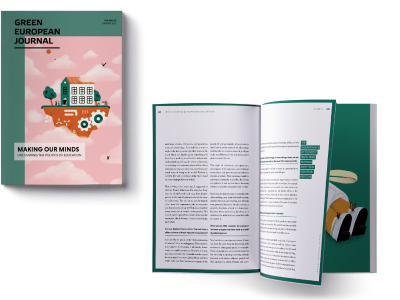Throughout history, universities have been birthplaces of new ideas and movements. In the late 20th century, student movements such as that of May ’68 shook the world and reshaped society for generations. Today, universities continue to play their critical role as laboratories for social and political change, but their capacity to do so is waning. Between government control and the pressures of cuts, fees, and precarity, many students and academics are on the back foot.
This text is part of Struggles in the University, a panorama bringing together the voices from movements in and around the university. We hear from representatives of campaigns to keep students out of debt in the Netherlands, oppose chronic student housing shortages in Hungary, and demand a decolonised education in Belgium, as well as academics resisting worsening working conditions in the UK. Their experiences reveal an ongoing struggle to stand up for the emancipatory promise of education and reach out beyond the walls of its institutions to build a better society.
After the death of George Floyd and the wave of Black Lives Matter protests reached Belgium in 2020, the Belgian government convened a commission to examine Belgium’s colonial past. For decades, Black communities and organisations in Belgium have been advocating for this commission. Ministers and local politicians have since held discussions on teaching Belgium’s colonial history more extensively in schools as well as on decolonising museums and public spaces, many of which are populated by statues of King Leopold II.
The campaign #DecolonizeKULeuven puts this challenge to the Catholic University of Leuven (KU Leuven) – Belgium’s oldest university and one of Europe’s most prestigious educational institutions. It is run by Undivided, a student-led organisation that focuses on gender, decolonisation, anti-ableism, and supporting LGBTQI+ students. Alongside other relatively new African student associations in Belgium’s universities, Undivided advocates for the overdue reckoning with academia’s colonial past. The #DecolonizeKULeuven manifesto launched in 2021 sets out a roadmap for decolonising the university. Its 10 demands cover issues such as Eurocentrism in curricula; KU Leuven’s participation in Belgium’s colonial past in Congo, Rwanda, and Burundi; and the precarious position of cleaners and other university support staff.
The campaign is one student-led action within Undivided’s broader work. Since its founding in 2018, the group has organised lectures, panel discussions, documentary screenings, and protests. The platform also advocates for the wellbeing of LGBTQI+ students of colour. Its gender justice agenda involves making sure that the university responds to instances of homophobia or transphobia and advocating for a racial justice approach to the university’s gender equality policy.
As of 2019, only 30 per cent of KU Leuven professors were women. While the university does not collect data on the ethnicity and racial origin of its staff, it is clear to us as students that these are almost exclusively white women. Undivided believes that the university doesn’t just need more women faculty members, but also more women from lower socio-economic backgrounds and different ethnicities to reflect the society we live in.
Our experience of organising as students at the university started off positively. From 2018 to the summer of 2021, the university funded Undivided as they deemed its work vital. We were also invited to take part in KU Leuven’s Diversity Council, which was an opportunity for our criticisms to be heard and influence the council’s long-term policies. Eventually, the university rejected our criticism and approach, which centred on decoloniality and intersectionality. In addition to withdrawing funding, the chancellor of the university branded Undivided as “woke” and indicative of “cancel culture” that “threatens academic freedom of thought”.
This pushback threatens to stifle representation of students from minority communities, which has long been absent at the university. Despite the opposition, Undivided continues to put the challenge of decolonisation and intersectionality to KU Leuven. We are striving for an academia that sheds its pretence of neutrality and rejects the West as the sole point of departure for knowledge.

